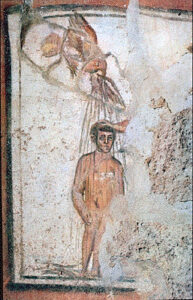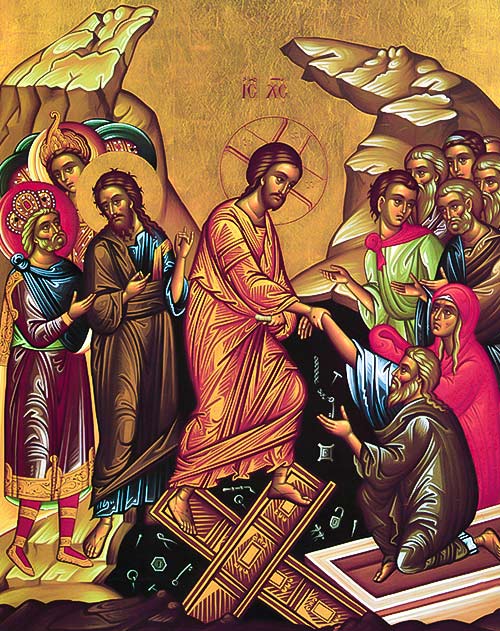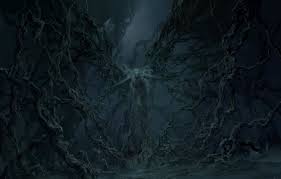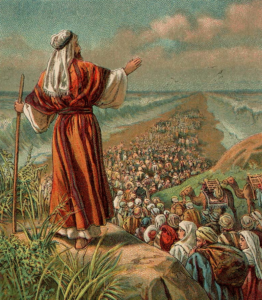Pre-Script, written Holy Friday, 11:30 a.m.
Forgive me for beginning with a personal note.
I just discovered tonight’s Lamentations Service livestream from Agios Demetrios Church in Piraeus, a suburb of Athens near where Khouria Dianna and I used to stay. Any Protestant readers, including me long years ago, would not believe what it was like. Nor would we Orthodox in the West with our comparatively sedate services.
There are three bishops (?), along with monks, priests and many young chanters (seminarians?) crowded around the bier/kabuklion, trying to make room for people who are coming up to venerate the Epitaphion. During the singing of “Many generations”, the bishops pushed their way around the kabuklion to do the censing, then one bishop shoved even harder down and up the aisle to sprinkle the congregation with rose water. Meanwhile people here and there are snapping photos. All the while a bell tolls the death of Jesus.
… … …
Now some time has passed. The great Procession has gone outside, and I hear singing approaching from the back of the church. The bells are still tolling.
All week, as I’ve listened to music and watched videos preparing for these Blog Posts, I’ve been getting teary-eyed, and this has really set it off! What is it? old age? my inexplicable love for Greece? and knowing I’ll not be there again. Those, likely. I’m sure it’s my love for Orthodoxy and Orthodox Holy Week, which always fills my emotions. Most of all it’s my love for Jesus, which grows stronger and deeper each year. Praise God for my tears.
Also, I’m feeling so sad for those who don’t know the beauty and strength and joy and freedom of Christ and His Holy Orthodox Church.
Thank God, despite all, for modern technology.
I’m going to go back for Pascha – Saturday 4 p.m. CDT, Midnight Greek time. If you want to do so: https://www.youtube.com/watch?v=Gu6eEA2y9fk
Enough of this.
[P.S. next morning. I discovered that because of the Pandemic there is a curfew in Athens, and the “Midnight” service began about 8.pm,]
Vesperal Divine Liturgy of Saint Basil the Great
Brothers and sisters, there is a whole lot going on this morning. Follow closely.
This Liturgy begins as a celebration of Christ’s victory over Satan and death “down below”, and by the middle we’re almost celebrating the Resurrection here “up above”. In the two hours or so in between, many things happen. I have discovered that these vary a little from archdiocese to archdiocese and parish to parish. It can be a bit confusing. But here goes:
Anciently this morning’s service was the beginning of the Paschal Vigil which began probably late afternoon on Holy Saturday and ended after dawn Pascha morning. Judging by my short time on Mount Athos, I suspect this is still the case there. But for the sake of us “wimps” out in the world, long ago the parish Vigil was greatly abbreviated into only (!) about five hours, and separated into two parts. The first comes in this morning’s Liturgy – which (because it once began in the evening) explains why it is still a Vesperal Liturgy. The rest of it comes late tonight in the midnight Resurrection service, Paschal Matins and the Paschal Divine Liturgy, which goes on well into the early morning hours.
Are you following so far? We’re just getting started.
During the ancient Vigil there were many Baptisms, for many people were becoming Christian. These took place outdoors in “living water” – see John 7:37-39 – which in April even in the Mediterranean world must have been very cold! Those being baptized were naked, as a sign of totally leaving their old pagan life behind and starting afresh.
Sorry, folks, no sprinkling. The Greek verb βαπτίζω, “vaptizo”, means “to immerse”. They “drowned” their old life, and arose out of the water to new life in Christ. Men and women were baptized separately – men by deacons, women by deaconesses – just in case you wondered.
Ancient mural. The anointing is from Heaven.
Meanwhile the Vigil continued in church. The newly baptized would be dressed in white robes and then process into church, as all sang “As many as have been baptized into Christ have put on Christ”. They were welcomed as new members of the Church, were present at the celebration of the Anaphora for the first time (!), and received their first Holy Communion as the sun was rising in the east, and as the Light of Christ was rising in their hearts. An ancient title for Baptism was “Illumination”. We can only begin to imagine how overwhelming this was, how profoundly it was imprinted in their hearts and souls, and of all present as they recalled their own Baptisms.
This is why we still sing “As many as have been baptized…” at Baptisms, as the newly baptized go from the baptismal font to the soleia (before the iconostasis) to receive their first Eucharist. We sing it also at the Divine Liturgy on days on which Baptisms took place in the early Church.
by permission of Creative Commons
Now, back to today’s Saturday morning Liturgy:
In the stichera early in this Vesperal Liturgy, the devil wails: I should never have taken Him in. I’ve lost my captives. I’m defeated. For today, “down below”, the victory has been won. Christ Himself has gone into death, into the darkness, the devil’s kingdom, and has broken down the gates of hades and “harrowed hell” (as some have described it), and led the captives out into His Light.
Now it is clear, looking back to yesterday, that ultimately it was not “the world” which killed Christ. It was Satan. And it didn’t work. It was Satan who lost. Now death has been defeated from the inside. As we will sing tonight and again and again through the great Forty Days, “Christ has trampled down death by death and upon those in the tombs bestowing life”. Christ our God is stronger than death!
Tonight our Paschal icon will show the hinges and bolts of the doors of hades and of death flying in all directions, so they can never be put back together, and we can see Jesus Christ leading the dead of all times, the “formerly dead”, up out of the darkness into the Light. 
Now, let’s take a little detour, lest anyone be confused. Do we Orthodox believe that hell is literally “down below” and that its gates had hinges? No. No more than we think Heaven is up there in the clouds somewhere. Nor do I think that is what the early Christians believed.
by permission of Saint Isaac’s Skete at skete.com
We live today in a literalist world. Anciently people understood symbolic imagery. In relation to our world, Heaven is a series of “higher dimensions” into the Light. Paul spoke of “the third heaven”, presumably out of seven, which he was told not to even try to describe in words. “Above” and “beyond” that is Eternity and infinity, beyond all dimensions, where dwells God who is completely inaccessible and unknowable – or was till His Son became Incarnate.
Hell likewise is a series of “lower dimensions” leading ever further into the darkness and finally utter nothingness. There is where Satan once held his captives, where, as one translation dreadfully puts it, “the land where all things are forgotten” Psalm 88:12 – or in another translation “the land of obliviion” – those words haunt me – where we just faded away into nonexistence.
Here is where death once took us. Here is what Satan had prepared for all who died.

But death is not of God. Our God is the God of life. After we had sinned, God accepted our deaths, because otherwise we would have gone on forever in sin. That’s the story of the Garden of Eden. But then Christ came and entered into death, and destroyed death by His death.
Back to today’s Divine Liturgy:
Another theme: One of the stichera this morning says that today “is the Blessed Sabbath” which Moses foresaw, the seventh day of the week when Christ our God rested in the tomb from His labors, as once He rested on the seventh day after He created the world. And now will come an Eighth Day! the First Day of a new and greater and eternal Creation, the renewal, completion and fulfillment of the first creation.
In this Holy Saturday morning Liturgy, there are fifteen, count them fifteen, readings from the Old Testament. (Well, many churches don’t do all of them.) Will we look at all of them here? No! But the point of them is that all the Old Testament prefigures Christ and His new Creation in one way or another.
OK, since I heard you begging… just one example: We read the story of the Exodus, because this is our new Passover. I’m sure you know that the word Pascha itself means Passover. Greek Orthodox wish each other “Καλό Πάσχα!”, “Kalo Pascha”, “Happy Passover”! Christ is our new Paschal Lamb. 
At the Exodus, the Hebrews sacrificed the Paschal lamb, and the angel of death passed over them. Moses then led the people up out of slavery in Egypt, through the Red Sea, across the desert, where God provided them manna to eat, and on to their promised land. So at Matins we sing with the Hebrew children: “God has triumphed gloriously!”
anonymous, 1907, US Public Domain (Oh, I do hope that’s not Charlton Heston.)
Christ is our new Moses, He is our new Paschal Sacrifice, and this our new Exodus. He leads us up out of slavery to sin and death through the waters of Baptism, feeds us with new manna, the Eucharist, and across the desert of this life towards our true Promised Land. Christ our God has truly triumphed gloriously.
Now let’s move way ahead: Early in this Liturgy, the clergy are still vested in the violet of Lent, till just before the Gospel they are re-vested in white. Then the priests sprinkle bay leaves (laurel leaves) and flower petals all about the church. Laurel leaves crowned the heads of victors in the ancient games. With laurel leaves and flowers we prepare the way for Christ the Victor.
When I was a new priest – chrismated one day and ordained the next (definitely not the ideal way to do it, which I may explain someday) I had never seen this Liturgy, and when I read the instructions I was startled. My mother taught me never ever to throw things around like this indoors, and when I scattered the leaves all over the place I felt very guilty! amd one of my former Episcopalians looked totally aghast. But it was great fun! It still is.
Speaking of which, here is a very enthusiastic Greek priest. I wish I could locate the source, and that the audio would come through better
And then, even though we’re not quite “there” yet, a Resurrection Gospel (Saint Matthew 28:1-20) is read, which covers the whole Forty Days from His Rising to His Ascension.
Yet another subject: In Jerusalem this morning, the Patriarch brings the Holy Paschal Fire out from Christ’s Holy Sepulchre into the Anastasis, the ancient Church of the Resurrection. Below the Holy Sepulchre is in the middle. It is shared through the church, then taken to local churches to  be brought out to the people at the beginning of the midnight Paschal Liturgy. This being the modern world, the Fire is now flown (very very carefully) to many places including Greece, Eastern Europe including Russia, through the Middle East – and at least once to Wichita, Kansas! (See way below.) Middle Eastern and European and British media cover this every year. A few American media are now catching on.
be brought out to the people at the beginning of the midnight Paschal Liturgy. This being the modern world, the Fire is now flown (very very carefully) to many places including Greece, Eastern Europe including Russia, through the Middle East – and at least once to Wichita, Kansas! (See way below.) Middle Eastern and European and British media cover this every year. A few American media are now catching on.
Here is last year’s sad account from Reuters.
Now, listen closely: For centuries, the Paschal fire has lighted spontaneously in the Sepulchre – sometimes even doing so among the congregation before the Patriarch can bring it out. Seriously! This has been reported for well over a thousand years. For much on this see: http://www.holyfire.org/eng/index2.htm I first looked at this askance, but unless you want to think that all these centuries there has been a continuous, undetected, conspiracy by liars, and nobody has ever “squealed”, ever gave away the secret, not even once… Really?
If you want a quiet, dignified Pascha, the Church of the Anastasis is not the place. This video from 2017 is not professional, but it gives you a good sense of the excitement. The fire arrives a little after 5:00.
And now from Kansas:
https://www.kansas.com/living/religion/article152624084.html
I told you there is a lot going on this morning!
Jesus Christ has already won the greatest victory down below, and Saint Matthew has told us what is coming here on earth. It’s no secret – hasn’t been for 2000 years.
However, not till the Paschal celebration tonight do we sing “Christ is risen from the dead…”, nor do we say “Christ is risen!” “Truly He is risen!”, nor does the Lenten Fast end. Not quite yet.
Which, in my case, means no pepperoni pizza or cheeseburgers or solid chocolate (don’t ask…) till Midnight. Hang on for just a few more hours! Or maybe if I watch the Paschal service in Greece, can my fast end on Greek time, eight hours earlier?
Tonight: HOLY PASCHA!